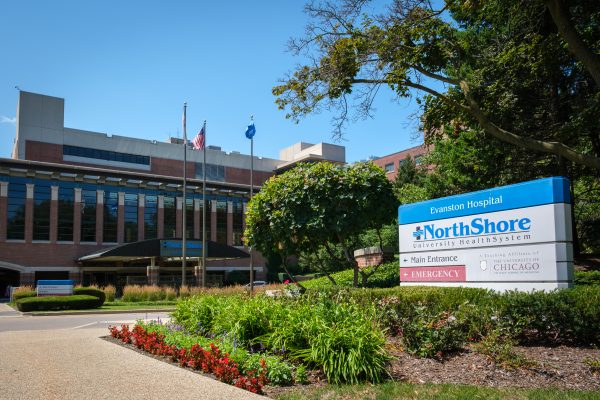
Endeavor doctors take turn as Medicare plan marketers
(Editor’s Note: This story was reported by Mark Miller for the Evanston Roundtable, a neighboring independent newsroom. It was shared with The Record as part of an ongoing collaborative effort.)
You may have seen those Medicare Advantage TV ads featuring celebrity promoters like Joe Namath and William Shatner. Now, Endeavor Health has added a new type of Medicare Advantage promoter to the roster: Its own primary care physicians.
If you’re enrolled in Medicare and receive primary care through Endeavor, you’ve been sent a letter signed by your doctor urging you to consider a Medicare Advantage plan from a company called Essence Healthcare during the annual enrollment period that got underway Oct. 15. That’s right — an insurance pitch signed by your very own doctor.
The Medicare Advantage industry spends millions of dollars on advertising to fuel its growth during the enrollment period, which runs through Dec. 7. The federal government started cracking down on some of this advertising last year due to concerns about misleading marketing claims.
But a letter from your doctor seems like something brand new. The letter (full text here) announces that Endeavor has “chosen Essence Healthcare, an insurance company we highly respect, as one of our Medicare Advantage partners” starting next year.

Endeavor says that its aim is to offer an insurance plan that does a better job for its patients.
“The Medicare Advantage plans that are dominant in the market are connected to one of the large payers like Humana and United Health Care, and frankly, they haven’t all been structured in ways that are the most supportive of the kinds of care that patients need,” Dr. Lakshmi Halasyamani, Endeavor’s chief clinical officer, told the RoundTable.
A better Medicare Advantage plan would be desirable. These insurance plans have grown rapidly in recent years, now accounting for about half of all Medicare enrollment. But they come with major drawbacks that enrollees often don’t understand when they first sign up.
The letter paints an uneven portrait of enrollment choices that could lead some Medicare beneficiaries to lose important coverage options permanently if they are not already enrolled in an Advantage plan. But the letter also fails to disclose that Endeavor has an ownership stake in the parent company of Essence Medicare plans.
The annual enrollment period is the time when people on Medicare can make important decisions about how they will receive health care in the year ahead.
Losing your traditional Medicare option
One choice you can make during the enrollment period is to switch the fundamental nature of your coverage.
Everyone enrolled in Medicare has gone down one of two coverage paths, choosing either traditional Medicare or Medicare Advantage. This is the most fundamental decision you can make about your coverage, and you can change it during the annual enrollment period.
Traditional Medicare is the original fee-for-service Medicare. You can visit any doctor, hospital or other health-care provider that participates in Medicare anywhere in the country; the government pays the provider directly for each health-care service you receive. You will pay a monthly premium for Part B and 20% of Medicare coinsurance after meeting an annual deductible. Most traditional Medicare enrollees add a Medigap supplemental insurance policy to cover some or all of these out-of-pocket costs. Most also add a Part D prescription drug plan.
Medicare Advantage is a managed-care alternative to the traditional program that combines Part A and B services, and often Part D prescription drug coverage. The plans are offered by health insurance companies; most are health maintenance organizations, commonly called HMOs, or preferred provider organizations, aka PPOs.
During the enrollment period, you can change your drug coverage or shift between Medicare Advantage plans. You also can move back and forth between the traditional program and Advantage — with one major caveat: When you enroll in traditional Medicare, it’s important to have supplemental coverage to cap your total out-of-pocket costs. Very often that comes from a Medigap supplemental plan, although some people get this coverage from their former employer or union.
The best time to buy a Medigap plan is when you first sign up for Medicare. That’s because health insurance companies cannot turn you away due to preexisting conditions during this sign-up window, and must offer you the best prevailing price. After this “guaranteed issue” window closes, you may not be able to buy a Medigap plan at all (Nine out of 10 Advantage enrollees don’t have a guaranteed issue right, according to research by KFF). That means a shift into Medicare Advantage may be effectively permanent — while you can shift back to traditional Medicare later, you might not be able to obtain a Medigap policy.
Endeavor’s recommendation of one Medicare Advantage provider over others might — or might not — make sense. But the letter makes no mention of traditional Medicare as one of the choices for patients, or that you can stick with the traditional program should you choose. That could lead some patients to drop their traditional Medicare, a decision that could be irrevocable should they decide to return later but are unable to restart Medigap coverage.
“We’re going to make sure that patients have access to our Medicare website, which makes that very clear,” Halasyamani said about access to that option. “I think what’s important is that patients will always have a choice. They can choose whether to remain in traditional Medicare, or they can choose to choose a Medicare Advantage plan. And, this is why providers are not able to enroll patients in any specific product — that’s the role of the [insurance] broker.”
But the letter’s website link takes you to a page that invites you to download a MedicareAdvantage enrollment kit from Essence. That’s it. (Elsewhere on its website, Endeavor offers an overview of coverage choices that mentions traditional Medicare, albeit briefly.)
The ownership stake
Endeavor took a lead role in April raising $100 million in capital for Lumeris, the parent company of the Essence insurance plans. Endeavor spokesperson Spencer Walrath declined to respond to a RoundTable question about the size of the investment, which has not been publicly disclosed. Halasyamani is serving on the Lumeris board of directors, and Lumeris and Endeavor are partnering on a new integrated care model for traditional Medicare patients called ACO Reach.
Walrath described its partnership with Lumeris as a way to “decrease our administrative burdens so we can focus on providing high-quality care.” It also is part of a “broader commitment to improving population health [and] and delivering more integrated, patient-centered care,” he said.
The Endeavor letter “highly recommends” Essence insurance, but does not disclose Endeavor’s tight relationship with Lumeris, a company in which it has a financial interest.
An Essence advantage?
The Endeavor letter states that the Essence plans offer patients “increased access to high-quality, affordable care.”
What kind of increased access? Halasyamani pointed to health care resources that some Advantage plans provide in addition to access to physicians: “[If] you happen to choose any one of the Medicare Advantage plans, those will have a benefit design structure that may include a health coach, that may include a pharmacist, or a social worker that can provide you a ride to your appointment. All of those are very much things that Medicare Advantage plans may have as part of their benefit design structure.”
Except there’s no guarantee you’ll have access to those benefits. Advantage plans often market these extra benefits to prospective enrollees, but decisions to actually provide them are based on needs assessments made after you sign up.
How about affordability? Medicare Advantage pitches often include claims about saving money on copays and premiums, but traditional Medicare is not more expensive than Advantage when you consider total costs, not just premiums. Surveys of Medicare beneficiaries find that the proportion of beneficiaries who find their care affordable is no greater in Advantage than in traditional Medicare, according to a recent article in the Journal of the American Medical Association.
For more on Medicare’s annual enrollment period and how to shop it, see my recent column for Morningstar.
The Record is a nonprofit, nonpartisan community newsroom that relies on reader support to fuel its independent local journalism.
Subscribe to The Record to fund responsible news coverage for your community.
Already a subscriber? You can make a tax-deductible donation at any time.


